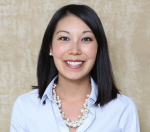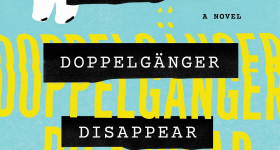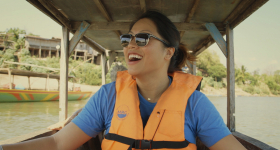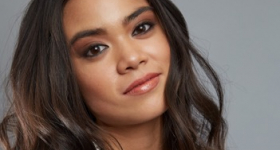Next month marks five years since the inception of Asian Americans for Civil Rights and Equality (AACRE), which is a network comprised of 11 organizations fighting for justice through an intersectional lens. AACRE works with Asian, South Asian, Southeast Asian and Pacific Islander refugees, immigrants, LGBTQ, incarcerated folks, artists, faith leaders, survivors and more! AACRE’s work has allowed them to reimagine a vision of liberation that is inclusive and intersectional. The five-year anniversary celebration is a momentous occasion, and AACRE will be celebrating their work with a Party for Justice on June 7 at 9:00 pm in San Francisco at the Westin St. Francis on Union Square.
The Party for Justice will feature many amazing Asian artists and performers.
Hosting the night as emcees at AACRE’s five-year-anniversary Party for Justice are the Rice Rockettes, a San Francisco-based Asian Drag Troupe that came together in 2009. Hyphen was fortunate to speak with Rice Rockettes founder, manager and “Big Mama,” Estee Longah.
So, Estee, tell me about yourself and your involvement with the Rice Rockettes.
I started doing drag in 2005 at a time when there weren’t a lot of Asian and Pacific Islander drag queens. N Touch was the only gay Asian bar in the city at the time, and that’s where I started going.
We decided to form this group to address this need; there weren’t a lot of Asian drag queens at the time. Officially formed in 2009, this year is our 10-year anniversary. We didn’t think we’d last this long, but here we are.
We consider ourselves the premier Asian American drag troupe in San Francisco.
I don’t have an official title. Oftentimes I am called the founder and manager. Sometimes I’m called the Big Mama. Any of those fit!
Has the mission of your organization evolved at all over the years, or are you still primarily focused on and committed to raising awareness as a sort of San Francisco health ambassador? What other types of activism do you participate in?
In many ways we were tied to a social justice/sexual health sort of slant, mostly just because at the time when I formed the group, I was working with the Asian Pacific Wellness Center (now called the Community Health Organization), which is a community health clinic in the Tenderloin area, serving the Asian Pacific Islander communities and more specifically the gay and LGBT Asian population.
I was there for seven years and we’re actually kind of a spinoff of an original group called the Rice Girls. They were affiliated with the API wellness center and mostly performed in spaces where they did a lot of sexual health messaging and their performance was kind of secondary.
We formed after that. There were about three to four years between Rice Girls and us. We reinvented the Rice Rockettes as a sort of homage to the Rice Girls. We did some community work. We supported the Gay Asian Pacific Alliance support and other organizations as well. We also did some work with drag queens against gun violence last year with some of the younger girls involved in the group.
How does one become a Rice Rockette?
People often think it’s very hard or very confusing and it’s actually very easy.
For me, nerves are the very most important thing. Not only are you a man getting into a woman’s clothing, which is still seen in many places as very taboo — you’re putting yourself out there to be a target, but at the same time you’re getting onto a stage, performing in front of people. We are a performing house. There are eight active, performing members.
The first step would be to come to me and tell me, hey I want to be a drag queen. I’d be like, "Okay, perfect. Let’s set up a meeting." A lot of people miss that step and think I’m going to go up to them and say, “Hey, you’re great.” Mostly, though, I’m waiting for that first step of expressing interest. After that, everything is just cheesecake. Talent can be cultivated; dancing can be cultivated. We’re here to cultivate all of that by creating a safe space within the community to explore what drag means to them and to help them grow their own craft. I’m not really looking for anything except for that nerve part. The rest falls into place. I want to find people who can work in a group. Divas are great but I think they’re better off on their own.
Why did the Rice Rockettes have interest in emceeing and performing at this AACRE event?
We do several community events a year. I like AACRE and feel their work is very important. And they’re API, so we were excited to support the group and to support their five-year anniversary.
What do you like most about performing? Why do you do it and how did you get started?
I got started in 2005. I was in my 20s. I immigrated here from Guam and went straight to SF. I didn’t really know or understand drag culture then. It was so not mainstream the way it is now and coming from Guam, it was unheard of. I wasn’t quite sure what it was. I started going to this club called N Touch on Thursday nights. Club T’s was the name of the drag show N Touch had every week. I loved It and was completely floored. It was the first time I saw an Asian drag queen, which was very different than regular drag. I never saw an Asian face until that night and had no idea I could do this and be that person. I was also a person who wanted to perform and be an entertainer. But when you have a singing talent or a dancing talent, you become a performer. If you don’t have any talent, then you become a drag queen, as I say [laughing]. Drag is all about the illusion of being a woman or the illusion of being another gender — or just the illusion of having talent. It’s someone else’s song and you’re lip synching it and making the audience believe it.
I was always a shy gay boy growing up in a very repressed island community, so I always wanted to be a performer but never saw myself in that. Then when I saw drag I thought, it’s almost like a mask or another character. It’s not me but another persona.
How do you feel as a gay Asian male performing in drag? How do you feel about that part of you as an Asian American and how do you feel that has affected you and shaped how you go through the world?
I think that in general, being a drag queen, you do have an element of danger regardless of your race or ethnicity. People say San Francisco is the most open city in the world, but I’ve seen my transgender sisters still get attacked, killed or assaulted on the streets. So, it’s not to say that it can’t happen. We always try to be really safe about how we do things. I always try to ensure we move through in a group. Because it can happen. It’s happened to some of my fellow drag queens that I know in the city. I know they’ve been attacked so you always have to be vigilant about that.
Times are changing. When I first started just going back to how it was before, I really think that in the ’90s in San Francisco, we lived in a bubble. There was a very different movement going on pretty much started by Gay Asian Pacific Alliance, and it was how to go against that stereotype that gay Asian men are submissive and docile. There was that whole thought in the gay community. Especially during the ’70s, ’80s and ’90s, gay Asian men were considered the bottom of the barrel and were only sought after if you wanted some femme, sissy boy. So, there was a lot of backlash in the community about that and I think that one of the things they were trying to do is hyper-masculinize themselves in the community.
Most of the gay Asians at the time who did go into drag eventually transitioned, and it was a stepping stone for them. So I think the community was seeing that, and there was a very negative perception of drag at the time. And I feel like I got a lot of misperceptions among my family. I’m a gay man. I just have a creative side and I like to perform, and I like to perform as a woman and as this persona, Estee. We had to push in the early years. I think [RuPaul’s] Drag Race has really opened the door to drag and sort of made it very mainstream and I don’t think I get that conversation as much, but I do remember that going on a lot at the beginning. There was still a lot of hesitation in my community to date me or date us, and I think that might still be going on because they don’t understand what they’re getting into.
How does doing drag affect your relationship with your family?
I don’t have a typical story, so am not sure if I’m the best representation for that sort of thing. I didn’t come out. I was thrown out of the closet. My mom found a journal when I was in my teens, around 15 or 16, and it’s me talking about liking my male classmate and she got upset, as most Asian mothers would. She cried and made me swear I would never tell anyone else in my family because it’s this horrible thing. Of course, she goes behind my back and cries to all of them over the phone, so essentially, she outted me to my entire family. But we did still revert to the normal, sort of how Asian families deal with children who come out. A lot of times they say that when gay people, LGBT Asians, come out of the closet, their families essentially go into the closet. So there’s an underlying level of shame or even if it’s not shame, they don’t really talk about it and I think for years, my family has never talked to me about being gay — who I am dating or anything like that. But on the plus side, I can say that my drag has been hard to hide. I’ve been on TV, so they kind of know and actually a few of my aunts have come to a show I did when we were performing at Gay Day at Six Flags in Vallejo, and they actually showed up. I was really pleased and shocked, and they loved it. So, they do know that I do drag. Except for one I’m really close to, they don’t really sit down and talk to me about what it means. One aunt did ask if I was transitioning and I explained that no, that’s not what's happening. I'm a gay, Asian man who just likes to dress in drag.
My mother actually passed away already. She knew I was gay. I don’t think she knew I was doing drag because it was a long time ago. I think that if she had been alive, I probably would have told her at some point, but we’ll never know because it never happened. so I don’t know how she would have reacted to it. Considering how she reacted to me being a vegetarian, I’m sure it would not have been pretty [laughing]. It would have been a very drama-filled Filipino moment.
How would you describe what you do and why you think it’s important?
I think especially in SF, drag is so all-encompassing. It’s very diverse. You get all sorts here in SF. If you go to other smaller towns or even NY or L.A. you’ll see that polished, RuPaul drag that’s coming out there, a specific type of drag. One of the things that’s great about SF is that you’re going to see all types of drag. You’ll see trashy drag, glam drag, chic drag, gender queer drag. All sorts and so I think that for any person going to a drag show, especially in SF, you’re not always going to know what you’re going to get and I think that’s the beauty of it. So, for a first-timer I’d say go with an open mind, go with probably a lot of alcohol because the girls will look better the more you drink! Be ready to be entertained. Their main focus is to entertain. Sometimes they want to educate but mostly they want to awe-inspire and just be themselves on the stage. You can tip or not tip. But tip if you like it because drag is expensive. But applaud at the end of it. Pay attention, don’t talk over the queens. Don’t dance on that stage unless they pull you up there. And just applaud. Because that’s what really makes it at the end of the day.
It’s like a geisha mask, that drag makeup mask with the wig. You’re a totally different person and you could find yourselves doing things you never saw yourself doing before.
Anything else you’d like to share with Hyphen readers?
That final line is always the hardest!
If there’s a reader out there, I know Hyphen is an Asian American magazine and not necessarily LGBT, but I think that there could be a gay Asian person who picks it up and reads it. I would say, you be you, you do what you want to do, find your drag family if that’s where you want to go, and find your supportive environment to help you grow into the fabulous person that you are. And if you want to be a drag queen in San Francisco, call Estee!
To learn more about the Party for Justice and to purchase tickets, go to:https://www.eventbrite.com/e/party-for-justice-aacre-5th-year-anniversar....










Comments